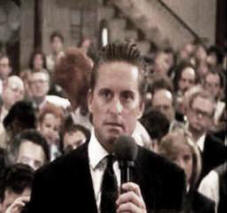
I got this forwarded e-mail
from a well-intended friend
who supports the war in Iraq:
******************
Interesting Thought for the day:
If you consider that there have been an average of 160,000 troops in the Iraq theater of operations during the last 22 months, and a total of 2112 deaths, that gives a firearm death rate of 60 per 100,000.
The rate in Washington D.C. is 80.6 per 100,000. That means that you are about 25% more likely to be shot and killed in our Nation's Capitol, which has some of the strictest gun control laws in the nation, than you are in Iraq.
Conclusion: We should immediately pull out of Washington D.C.
******************
Hmmm… That’s a very interesting statistic… But it seemed fishy to me for a number of reasons.
Since I’m not an expert on statistics, I enlisted one of my best friends, Matt Robinson (no relation), to help. Matt has his Masters degree in statistics and is now teaching stats at a local college. By the way, Matt has no axe to grind--he does not share all my criticism of President Bush and he is more supportive of the war than I am. He was, however, dismayed by the poor use of the statistics in this e-mail.
Here is a list of the misleading information that I want to point out in this e-mail's war propaganda:
1. The statistics are wrong for Washington DC.The Washington DC annual murder rate cited is misleading, in that the author cites a number that dates all the way back to 1991. Since then (when the 482 murders in DC dubbed the city “The Murder Capital”), the homicide rate has dropped every year to a number significantly lower. During the time of the current Iraq War, the numbers have been
248 in 2003, and 198 in 2004 (with 190 so far in 2005).
So, averaging the numbers of 2003 and 2004 (223), and then dividing that number into the
US Census Bureau’s 2004 population estimate of DC (553,523), we get a murder rate of 40.3 per 100,000 (223/553,523=.00040287 x 100,000 = 40.287).
BOTTOM LINE: DC’s homicide rate in the years of the Iraq War (not including 2005, which would make this number even lower) is 40.3 per 100,000, not the 80.6 that was reported (thanks, at least in part, to the strict gun laws in that city). 2. The number of months for the war is wrong.The war is not just 22 months old. The war started on
March 20, 2003. I received this e-mail on December 9, 2005. That means the war had been running for
32 months, not 22.
3. The mathematics of arriving at a “per 100,000” in Iraq number is wrong.The standard way of arriving at a “per 100,000” is to take the number of deaths per year and divide
that by the total population of that group
in that year. For instance, the Washington death rate in 1991 was 80.6 per 100,000. That is arrived at by taking the number of murders
in that year and dividing it by the total population of the city in that year (482 / 602,500 = 80 deaths per 100,000).
This is NOT done
on a monthly basis, for this dramatically lowers the number by a factor of 12. If we divided the number of deaths in DC by 12 months, we’d get 40.166 deaths per month. If we divided
that number by the total population, we’d get a much lower death rate of 6.667 per 100,000 (482 / 12 = 40.166 / 602,500 = .000666655).
The author’s numbers are therefore short by a factor of 12. His math looks like this:
2,112 troops killed / 22 months = 96 deaths per month.
96 avg. deaths per month / 160,000 avg. troop population per month = 60 deaths per 100,000 per month.
But this is not how a “per 100,000” number is found! Again, the standard is to take the number of deaths
per year and divide that by
the total population of that group in that year. The actual numbers look like this:
2,112 troops killed / 32 months =
66 deaths per month. That amounts to
792 deaths per year. To arrive at a “per 100,000” number, we divide deaths per year by population (792 / 160,000 = 0.00495) and then multiply that by 100,000. That makes for a
495 per 100,000 death rate among our troops!!
BOTTOM LINE: So, to correct the author’s first point, the number of American war casualties (what he called, the “firearm death rate” is actually 495 per 100,000, dramatically larger than the 60 per 100,000 he claimed.4. The number of Coalition casualties is wrong.In 32 months, there have been
2113 American troop deaths (not counting the 40 who had already died in December). That’s close enough to the 2112 that the author cited, so we’ll give him that one. But there have been a total of 2,314 total Coalition casualties in those 32 months. For some reason (probably because this is an argument against American withdraw from the war), the author did not include the deaths of our Coalition allies. This is rather jingoistic and dishonoring to the 201 men and women from other countries who have given up their lives in this war. Coalition forces from other countries number around
23,000.
So, when we include all coalition forces killed in the war, our number of deaths in Iraq actually drops (2,314 / 32 months = 72.3125 deaths per month x 12 months = 867.75 per year. 867.75 / 183,000 troops = 0.0047418).
BOTTOM LINE: The number of total Coalition troop deaths is actually 474.18 per 100,000.5. The statistics are manipulatively misleading for Iraq.Think about it. Whoever chose these statistics did this slight of hand:
Instead of looking at the
total number of deaths in Iraq, they chose only the number of deaths of
American troops. That would be like saying, “Washington DC has about 5,770 in its two police forces (including the
DC Metropolitan Police and US Capitol Police), but only
two police officers were killed there in 2004, so the murder rate in Washington DC was only 34.66 per 100,000!” Of course, that would be nonsense and nobody would put up with it. The real murder rate is 40.3 per 100,000 for the past two years (and 80.6 in 1991) because that’s based on how many
civilians were murdered in those years.
So, in order to compare apples to apples, we need to know how many
Iraqi civilians have been killed because of the current war. These statistics are enshrouded in mystery, but the estimates have that number,
according to Reuters, is somewhere between 27,295 and 30,789. The total population of Iraq is
24,683,313.
If we take the
lower estimate of civilian deaths caused by the war, divide that by the number of months of the war, we get an average of the number of
civilian deaths per month (27,295 / 32 = 852.96875 deaths per month). That amounts to
10,235.625 deaths per year (852.96875 x 12 months = 10,235.625). We can now arrive at the deaths per 100,000 for Iraqi civilians (10,235.625 / 24,683,313 = 0.00041467) That’s
a civilian death rate for the entire country of Iraq of
41.467 per 100,000.
And, please remember, that the statistic on the war-related deaths in Iraq is based on the
total population of Iraq, not just the most violent cities of Iraq. Again, to compare apples to apples, that 41.467 per 100,000 number should be compared to the total murder rate in the United States—which is
5.5 per 100,000.
Again, if we are to compare apples to apples, the Red Cross estimates that at least
800 civilians were killed during the U.S. military siege of Fallujah in November of 2004. The population of Fallujah was around
350,000. That makes for a death rate of
228.57 per 100,000 in 2004 for Fallujah. Now compare
THAT with the 40.3 in Washington DC!
BOTTOM LINE: The number of deaths in this e-mail inextricably excludes the civilians in Iraq who have lost their lives.
6. As an American in Iraq, your chance of dying is over 12 times higher than dying in Washington DC.The probability of an American civilian in Washington DC to lose his or her life is
40.3 per 100,000. The probability of an American soldier in Iraq to lose his or her life is
495 per 100,000.
So, if we divide 495 by 40.3, we get 12.2828.
BOTTOM LINE: The author claimed that "you are about 25% more likely to be shot and killed in our Nation's Capitol" than in Iraq. The truth is closer to this: You are about 1,228% more likely to be shot and killed in Iraq than in the Nation's Capitol.
7. The Christian call in the world is promote PEACE, not to cooperate with those who would promote WAR.As
I wrote during Christmas week, Christ is the Prince of Peace, and Jesus makes it clear that his followers are called the "children of God"
when they participate in his peacemaking.
“God blesses those who work for peace, for they will be called the children of God.” (-Jesus, quoted in Matthew 5:8, NLT)I know that this war is a very complicated issue, and that the implications of "pulling out too early" are grave.
However, in our attempts to figure out what we are supposed to do, let's get the facts straight, let's not manipulate statistics to make our case, and (especially for Christians) let's begin our discussions with the presupposition that our Christian mandate is to create
PEACE and not
WAR. We Christians need to begin
there in our discussions about this war.
Bottom Line: There are a lot of reasons not to pull out of Iraq too soon, but this e-mail's reasoning is just plain wrong.technorati: social action
 This is the “Trust and Obey” ethic. These Christians believe that what we need to do is read the Bible, the ultimate Rule Book for life, and obey the commands found there. According to this view, the most important part of being human is not, as Natural Law ethicists contend, Man’s Reason. It is Man’s Will—our ability to choose to obey God. They are confident that the Bible, plainly read and correctly interpreted, is that which humanity must obey in order to be moral.
This is the “Trust and Obey” ethic. These Christians believe that what we need to do is read the Bible, the ultimate Rule Book for life, and obey the commands found there. According to this view, the most important part of being human is not, as Natural Law ethicists contend, Man’s Reason. It is Man’s Will—our ability to choose to obey God. They are confident that the Bible, plainly read and correctly interpreted, is that which humanity must obey in order to be moral.
 Thomas Aquinas represents the classic representation of “Natural Law” Ethics, which posits that God reveals himself in the rational ordering of Nature (what is called “General Revelation”), and thus any human being, through his or rationality, should be able to determine right and wrong.
Thomas Aquinas represents the classic representation of “Natural Law” Ethics, which posits that God reveals himself in the rational ordering of Nature (what is called “General Revelation”), and thus any human being, through his or rationality, should be able to determine right and wrong.
 A hedonistic approach to ethics (that bases our actions on the happiness for myself and others) is not foreign to Christian thought. Twenty years ago, John Piper wrote
A hedonistic approach to ethics (that bases our actions on the happiness for myself and others) is not foreign to Christian thought. Twenty years ago, John Piper wrote 



